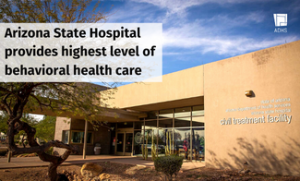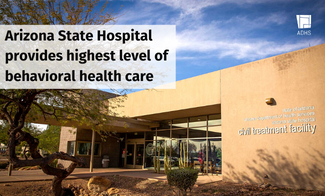 For more than two years, Arizonans have associated ADHS most with the state’s COVID-19 response. That makes perfect sense, as the global pandemic has required an all-hands-on-deck approach.
For more than two years, Arizonans have associated ADHS most with the state’s COVID-19 response. That makes perfect sense, as the global pandemic has required an all-hands-on-deck approach.
While that commitment is unchanged, we’d like to take time over the coming months, and starting with National Public Health Week, to highlight other things ADHS does to promote health and well-being for you and others.
I’ll start with the Arizona State Hospital (ASH), which has been under the leadership of Deputy Director/Chief Executive Officer Dr. Aaron Bowen for the past seven years. ASH is the largest division of ADHS, accounting for approximately 40% of our agency’s employees.
Treatment at ASH is considered the highest and most restrictive level of care in the state. Patients are admitted because of their inability to be treated in a community facility or because of their involvement in the criminal justice system.
ASH is Arizona’s sole public psychiatric hospital, with 360 beds for the long-term treatment of the seriously mentally ill. The facility now known as ASH opened in 1887 on its current site near Van Buren and 24th streets in Phoenix.
In the Civil Hospital, patients are involuntarily admitted under a court order. because they are a danger to themselves or others, are gravely disabled, or are persistently and acutely disabled. The severity of their illness requires the highest level of care.
In the Forensic Hospital, patients are committed under a criminal court order for behavioral health treatment because they have been found guilty except insane for a violent crime or they need restoration to competency so that they can be sentenced for a crime.
The Arizona Community Protection and Treatment Center (ACPTC) is a civil commitment program that provides supervision, care and treatment to men adjudicated as Sexually Violent Persons. All admissions, readmissions, and discharges from ACPTC are court-ordered.
Like more than 22,000 healthcare organizations across the country, ASH is accredited by The Joint Commission, the oldest and largest accrediting body in U.S. healthcare. The Joint Commission’s 2021 survey of ASH produced no significant concerns related to the care and treatment provided to the patients. ASH coordinates with the Arizona State Hospital Independent Oversight Committee, which reviews reports and data and visits ASH patients to make recommendations. These are just two of many regulatory and oversight committees with which ASH coordinates.
Hospital leadership understands that collaboration is the best path to growth and positive change – not just in its therapeutic relationships with patients but also with each other for the betterment of the facility. ASH leaders also engage in educational and training pursuits within the hospital and within the mental health community at large, both as teachers and students, as collaboration is what helps the field grow.
ASH’s clinical departments – nursing, psychology, psychiatry, social work, rehabilitation, and pharmacy – have extensive educational partnerships where professionals help to train the next generation of mental health care workers through internships and talks by staff members. The ASH Psychology Department’s internship program recently received a re-accreditation for a full 10 years by the American Psychological Association. ASH pharmacists have had publications accepted to a peer-reviewed journal, and the chief medical officer, Dr. Katharine Woods, gave a lecture at the University of Arizona on treatment-resistant and clozapine-resistant schizophrenia.
ASH leaders have used innovative solutions to help patients, including a pet therapy program and publishing a book of poetry from patients in the Civil Hospital.
I’m proud of the important work ASH does every day for Arizona, its commitment to continuously improving operations and patient care, and its leadership in the larger behavioral health community. I look forward to sharing more of its accomplishments in the coming months.










